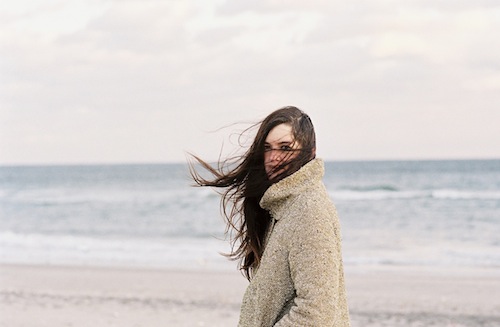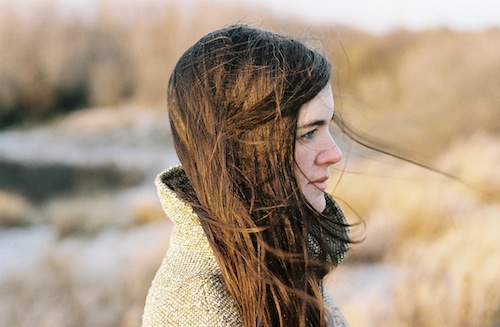Julianna Barwick (Interview)
So, there I was, sitting in front of Brooklyn Bagel in Los Angeles without the slightest idea of what to do. I patiently checked my cell phone, awaiting Julianna Barwick so we could start our interview. I had already been waiting a little over an hour; understandably, I was growing a bit weary.
Considering it was about 4:30 pm, I stuck around because the congested traffic coming from the major freeways in Los Angeles never really ends – it’s pretty much around the clock. Suddenly, my cell phone vibrates. The text reads: “Sorry this is taking so long. Esben needed to pickup a drum and it’s taking forever”. Knowing that Julianna’s touring mates, Esben & the Witch, pound their drums really hard, I wondered why they needed a new drum tom, given that the one piece they violently abuse besides the skins is the drum rim.
After gazing aimlessly at the brutalist charm of East Beverly Blvd, getting remarks from a young bum who advised me to stay in school, and eating a delicious but overpriced bagel, a white van dropped down from the heavens. Barwick didn’t hesitate to express her deepest apologies: “I’m so sorry. I owe you a beer”. Since all the nervousness had waned completely, the only thing that crossed my mind as they got off that van was that the Esben members looked awfully young.

Holding her entire music equipment in one oversized luggage bag, Barwick was entirely calm and collected, giving the impression of someone who’s fully embraced the touring experience. Even though Barwick looked quite tired, she welcomed me with a warm spirit. She didn’t hesitate to make our interview space a more comforting one, even offering me her IPhone phone charger because I was running dangerously low.
With an expectant look, Barwick sat up straight, awaiting my incoming interrogation. I proceeded to ask about the meaning behind The Magic Place. “It has a literal meaning. When we lived in a farm when I was younger, there was this tree and it grew up and over and all around. Being a kid, it was magical because you could get under there and it felt like a house. It felt very fairly tale-esque. My family just started calling it the magic place”.
Barwick’s words instantly sparked a nostalgic picture I had about my hometown. Having recently moved, I thought about my personal magic place. It was a soaring hill that overlooked a drawn-out reservoir. Since I was a little kid, I had always wanted to reach the other side of that hill. Knowing it was an impossible feat, I would fictitiously create stories; adventures in which I would climb up that hill.
Barwick’s pieces have that enchanting effect – they entice one to relive memories with a fantastical view. Although, she apparently had read my mind, since she was quick to clarify the album title with a more factual explanation. “It’s not a nostalgic album. It’s not about the tree, but there is a relation between the feelings I was having in my life, and the tone and the emotion of the song had this feeling of wonder”, Barwick clarifies.
Of all her efforts, The Magic Place achieves evolution without abandoning the basic structure of her earlier efforts, Florine and Sanguine. They co-exist with one other, but there’s a noticeable growth with each consequent effort. “All my records are progressions from the former record. There’s a tiny bit of guitar on Sanguine, and then there’s that little bit of instrumentation on Florine”, Barwick replies. "Sanguine was completely experimental. But when I got my hands on that loop pedal to record Florine, and all I had to record with was four-track, I was just messing around. I made a million of those.”
Having recorded her previous albums in a tiny apartment in Brooklyn, The Magic Place was the first one to venture into unfamiliar territory. Judging by the enthusiasm in which she spoke about the process, she’s malleable enough to know when the time to expand is right. “It was a friend’s space, and they weren’t using it at the time. And I thought it was cool to go to a place and not have to worry about helicopters going up the East River and all these disturbances. There were all these instruments lying around. I grew up with a piano, and I always loved to sit down and play, and with a baby piano lying round, I couldn’t resist it. That’s why you hear it in almost all of the tracks.”

For now, Barwick will continue to emphasize on what she’s learned with her loop station. Hearing how she speaks about Prizewinning with fervor, I’m pretty sure it’s the one instrument she couldn’t live without. Seeing eye to eye on one of the standout tracks in Magic Place, she describes it as spontaneous as how it came about. “It starts with me improvising with these loops. So I recorded the first loop, and then another one was in, and there was a hi-hat and a snare, and I just looped it. Not everything sticks, but sometimes I keep things in the first take. It seems to come out of nowhere and it works instantly”.
Minding the use of synthesized effects and looping techniques, the strongest aspect of Barwick’s music remains to be her beatific voice. Having been in choirs since she was a child, she took voice lessons, and engaged in an opera chorus after high school. “Choral music has always been completely appealing to me", she says. "Hearing a cappella singing, and how the voices just weave in and out of each other – I think that’s been my biggest influence.”
I bring to attention the fact that people refer to her music as spiritual. “I get it”, she replies with a tad of resignation. “Were talking spiritual feeling or spiritual like religion? Either way, I get it. I’ve had people say – God, I just totally cried my eyes out during that one song. When your senses are heightened, and your motions have peaked by music – it happens to a bunch of us. Like when you listen to something and you’re covered in goosebumps or you cry. It feels like a spiritual connection. And I can understand that because it happens to me”.
Barwick’s voice was meant to resound in the highest of cathedrals, vibrating with a force that can cloak your entire body with a natural high. I asked if the idea of recreating her vocal tracks into a live choir would work. She was thrilled about the thought, but remained modest about the idea of expanding her work ethic. “Right now, I’m at my personal independent mode because that’s all I’ve ever known”, she says. “But who knows what the future will bring. I can totally imagine putting together a special concert. As far as touring and recording, I generally like to do everything on my own – the special things, well, I’d consider trying all kinds of things”.
I followed with how I personally listen to The Magic Place. Barwick was bowled over with the idea of listening to it from beginning to end instead of taking it in separate pieces. Apparently, it was the first time it had crossed her mind. “Every piece is its own little thing”, she responds. “Every song is unrelated to the next. A few elements have been there for a long time – like the guitar part in Bob in your Gait; that’s two or three years old. I just put it in the order I thought it had to be put. But it wasn’t conceived all the way. I named all the songs at the very end, so all the naming and sequencing usually comes last for me.”
Having never seen her perform on stage, I was completely at odds with this notion of stopping a song that keeps building up. It astounds me how such a striking augmentation can be interrupted with applause - like when you presence an orchestral piece at a theatre, where every round of applause is calculated with meticulous perfection. She followed with her experiences playing on stage. “The first few times, I played with friends at apartments”, she begins. “I remember I got together with some friends and booked a couple of places. Having them in the audience every time I played. But with strangers, I’ve been lucky. People have been generally kind and receptive”.
Even if Barwick knows how to describe her process, she has a difficulty elaborating it. Coming from someone who writes with a very structured discipline, I asked her how she approaches creativity. “It’s an instinct”, she replies. I go about how it’s bothersome when people describe creativity as a muse that comes out of nowhere. She understands my reaction, but serves the question back to me. “It can go both ways. Just kind of appearing out of nowhere? I’m not saying I don’t concentrate and work on stuff, but when I’m creating it’s totally in the moment. I’ll keep whatever I love, and if I don’t like what I make, I don’t do anything with it. I work on the spot, and if it works, then that’s what makes me feel good.”
Overall, Barwick is still taking her current success with a genuine shock. “I’m still taking it in”, she affirms with her eyes wide open. “It’s been incredible. The response has been really positive and that’s wonderful. It’s really nice to read the response, you know? It helps me get a perspective about what I’m doing because I have a hard time describing my music. So I read what they write, and I’m like, that’s how it sounds! It’s hard to be objective about what you’re making because it’s so personal”.
Since both of us looked a bit drained out from the day’s unexpected events, I decided to lighten up the conversation with a request. Knowing she owned a cat, I asked her for some advice on owning a feline, since my significant other is passionate about cats. I felt somewhat obtrusive, seeing as I didn’t want to bore her with my impending dilemma.
“I hate to say it, but…”, Barwick laughs. She just noticed my terrified look. Suddenly, she claps, ready to give me the bullet points like an unrelenting salesman. Giving me an endearing glance, she goes on and on like a pro. I was seeing another side of Barwick - she had thrown away her shy demeanor and welcomed her chatty, animated side. Our barter about cats and dogs felt like talking to an old friend. I never got that beer, but at least the pleasurable tête-à-tête was worth it.
18 April, 2011 - 21:37 — Juan Edgardo Rodriguez